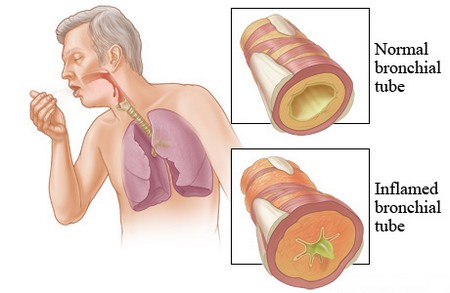Your doctor diagnoses your symptoms of fever, shortness of breath, fits of coughing, and burning in your chest as bronchitis. If these symptoms are new to you, you probably have acute bronchitis, a condition that’s harsh but doesn’t last too long. It can come on suddenly after a bad cold or after breathing irritating fumes. Acute bronchitis usually lasts only a miserable week or two, though your cough can last longer. Here are some steps you can take to fight it.
- Snuff out the smokes. The most common reasons for getting bronchitis are smoking and breathing secondhand smoke. Continuing to smoke irritates your lungs and bronchial tubes and will make your bout with bronchitis last longer.
- Fight the fever. To reduce your fever and relieve pain, take acetaminophen.

- Breathe easier. Take frequent hot showers or stay in a room with a warm vaporizer to give your throat and chest some needed relief. Clean the humidifier daily so that airborne germs collecting in the moist atmosphere won’t reinfect you.
- Rest and relax. Stay in bed until your fever is gone, and get plenty of rest even if you don’t think you need it. The more you rest, the more quickly you’ll get well.
- Wet your whistle. Every day, drink eight to 10 glasses of water, fruit juice, or tea to make mucus thinner and easier to cough up.
- Eat well. Nutritious food will help your body fight the infection. Eating junk food may be comforting, but it won’t help you get over bronchitis.
- Quiet your cough. It’s okay to take an over-the-counter cough suppressant, but only if your cough is dry (not producing sputum). You don’t want to stop a cough completely, since this could trap mucus and germs in your bronchial tubes and cause more illness.
- Declare war on germs. Use disposable tissues instead of cloth handkerchiefs, which provide long-term housing for germs. Dispose of the tissues carefully so you don’t infect someone else or reinfect yourself. Wash your hands frequently with antibacterial soap for the same reason.
Your doctor may prescribe a cough suppressant or expectorant to treat your cough. She might also prescribe an inhaler to open up your bronchial tubes and an antibiotic to fight bacteria.
Antibiotics are useful if you have a bacterial infection as well as bronchitis, but they don’t treat the bronchitis itself. Ask your doctor if antibiotics are really necessary before you take them. If your cough begins to produce greenish-yellow sputum, you probably have a bacterial infection.
The long-range plan for acute bronchitis
Here are some additional steps you can take to avoid acute bronchitis in the future:
- Shy away from smoke. The irritation to your bronchial tubes and lungs makes smoke and smokers bad company for you.
- Protect yourself. Fighting off an illness or taking medication will suppress your immune system and lower your resistance. That’s the time to stay away from people with colds. A case of acute bronchitis often begins with a simple cold.
- Avoid Irritants. Your risk of bronchitis is much higher if you breathe fumes from acid, ammonia, or other lung-irritating chemicals. Dust is another culprit that can cause bronchitis.
- Beware the chill of winter. If you don’t want your cold to become bronchitis, you should stay out of frigid air, an irritant to bronchial tubes. If you must exercise in really cold air, wear a face mask to warm the air before you breathe. When it’s cold outside, don’t sleep with a window open.